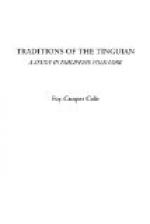49
A man and his wife were living in the field where they planted corn and rice. When they were there, the man died. The woman did not want to go to the town, because there was no one to watch the dead man. She could not bury him. The Ibwa [351] noticed that there was a dead man in the house. He sent one of his sons to get the dead man. When the Ibwa came in the house, the woman took the headaxes and cut him in the doorway. The Ibwa went under the house. His father could not wait for him; he sent his second son and his third son. The boys could not take the body, because they were afraid of the headaxes, for the woman had one in each hand. The Ibwa went there. He said to his sons, “Why do you not take the dead man?” His sons said, “We could not take him, because if we go up in the house the woman takes the two headaxes and tries to kill us.” Ibwa went up into the house; he broke the door of the house. He said to the woman, “Now I am your husband.” The Ibwa took the two ears of the dead man; he ate one and gave the other to the woman to chew, like betel-nut, to see the sign. The sign of the saliva was good. He made the woman’s two breasts into one in the center of her chest. He took her to his house.
50
The stems of the alangtin are good charms against the spirits of the dead, and are often worn concealed in the hair or hat.
There were two brothers, and one died. The other went to hunt and killed a deer. While he had it over the fire to singe, his dead brother’s spirit came to him. [352] Then the man began to cut the meat into small pieces, and as fast as he cut it up, the spirit ate it; and as fast as he ate it, the meat came out of his anus. When the meat was almost all gone, the man became very much afraid and started to run, and the spirit chased him. When he ran where some alangtin grew, the spirit stopped and said, “If you had not gone to the alangtin, I would have eaten you also.”
51
One person was dead in a town. They buried him under the house. They did not put banal [353] and a plow iron over the grave. The Ibwa went there and saw there was no banal on the grave, so he was not afraid. He went there and took the dead man. He put one foot of the dead man over each shoulder and let him hang down over his back. A man saw him while he was walking in the street. The man told the people in the town what he had seen. The people did not believe it and went to see the grave. No dead man there, only the clothes and mat.
52
It is good to put some branches of trees in the ground near your head when you sleep out doors, so the spirits can not spit on you, for if they do, you will die.
One man who had lost his carabao went to the mountains to find; and at night he did not find, so he lay down near the path to sleep. He did not put any branches near his head, and in the night an evil spirit came and wanted to eat him; but when the spirit saw that he had the skin disease, he did not care to eat, so he spit on him. The man got up and went home, but soon he got sick and died.




